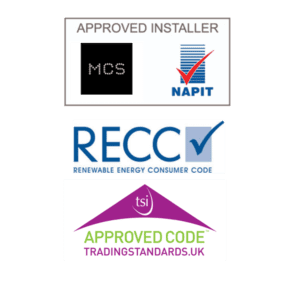
So You are thinking of installing Solar Panels to your home or business? Great, here are 5 things to consider before installing Solar PV.
[su_heading align=”left”]1) Planning Permission and Building Control[/su_heading]
If you are planning a solar panel installation for your home or business most of the time planning permission is not needed. However if it is in an area of conservation or is a listed building you may need planning permission. It is important that you check with your local planning authority to ask and make sure that planning permission is not required.
[su_heading align=”left”]2) Energy Performance Certificate[/su_heading]
If your motivation for installing solar panels has anything to do with the Feed in tariff (FIT) then you should first check that your property has an energy performance certificate (EPC) rating of at least a level “D”. Properties that achieve less than a D will be put on lower FITs.
There is also a small chance that the building you are going to put the panels on is exempt from needing an EPC therefore in most cases the higher tariff will apply. You will need to get an exemption certificate.
[su_heading align=”left”]3) System Performance[/su_heading]
Did your Solar Panel Installer get this right? It’s important to check that they have allowed for certain factors in there calculations / proposal.
These are:
Shading

A shading factor should have been allowed for in the calculation in almost all cases. Even nif the solar designer decided there is no shading, then a factor of 1.0 will be given this will start to decrease the more shading that you have. For example a shading factor for a small amount of shading could be 0.93. Installers calculate shading using shading charts and diagrams like the one in the picture. You can see here 6 areas have been shaded in grey. This means that the installer has factored in those 6 areas for shading within the sun path of where your solar panels are going.
Pitch
This will be given in degrees. Solar panels work at any pitch however the more they are angled towards the sun the better they will perform. Make sure that your installer has got this right.
Orientation
Again this is set out in degrees. 0 degrees being south. If your solar panels are going on a west facing roof, they will still work well. Make sure your installer has factored this into their predictions for you as it wont be as good as if they were facing south.
[su_heading align=”left”]4) Deposit[/su_heading]
Don’t be alarmed if a solar installer requests a deposit upfront. It’s common and excepted practice within the solar industry. Solar equipment is expensive and often installers will have more than one job running at one time.
If a solar installer is registered under the renewable energy consumer code (RECC) then they should never take more than 60% of the total contract up front.
There are options available to you that will allow you to protect your deposit. Simply ask for the deposit to be put into a bond account or insured. Again if the installer is RECC registered then they should be familiar with this system.
[su_heading align=”left”]5) Your right to cancel[/su_heading]
If you sign up to have solar panels installed and change your mind then that’s OK. You have a 14 day cooling off period before you are liable for any costs.
It applies to individuals (Consumers) there’s different rules for companies, but even companies installing solar should have the right to cancel. You will need to check your terms and conditions in the contract you have with your chosen solar installer.
Conclusion
Buying solar panels is a big decision, its important to use a good solar installer that can guide you through the process. The family behind Energy Creation have got years of knowledge and expertise within the solar industry. Please contact us today for more advice. Also check out this document from Renewable Energy Consumer Code. Its really helpful of you wanted further reading. https://www.recc.org.uk/pdf/top-tips-for-consumers.pdf





Agreed, solar is definitely moving forward with huge advancements in technology, and with the introduction of new organic fuel concepts – the future of solar is very bright. The only downside is the size and cost – however both of these issues will see solutions within the next 3-5 years, guaranteed. PV panels and AIO home hubs is where we should be focusing our efforts on!
Thanks for your comment Daniel, we agree and think solar power with battery storage is the AIO home hub choice for our clients. The future is bright! Looking forward to the next 3-5 years in this industry.